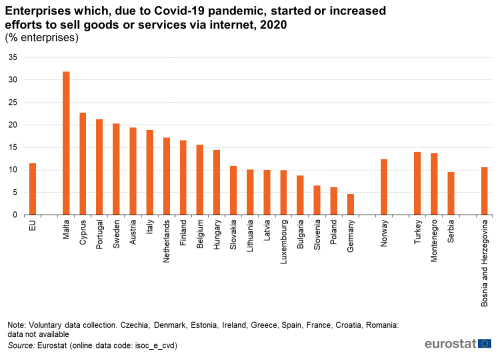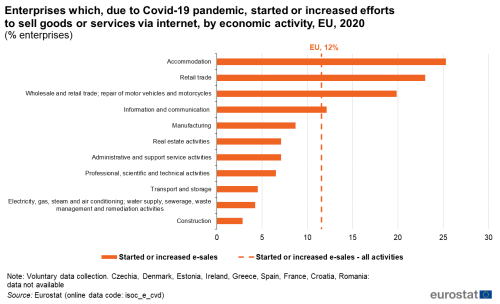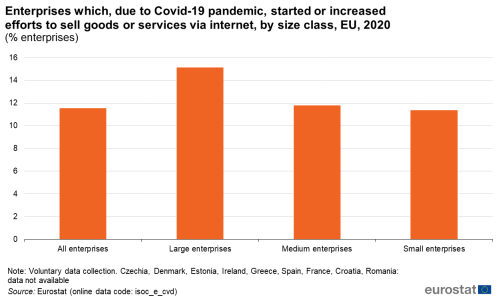Impact of COVID-19 on e-sales of enterprises
Data extracted in March 2022
No planned article update
Highlights
During 2020, the Covid-19 pandemic prompted 12 % of EU enterprises to start or increase efforts to sell online.
The share of enterprises that started or increased efforts to sell online in 2020 due to the Covid-19 pandemic was highest in accommodation related activities.
Enterprises which, due to the Covid-19 pandemic, started or increased efforts to sell goods or services via internet, 2020
For decades, digital technologies have been enabling enterprises to transform or even expand their business. For many enterprises, the restrictions introduced due to the Covid-19 pandemic pressed them to either switch to the internet as a new channel of sales, or to increase efforts to sell their goods or services online, highlighting the potential of digital technologies to increase the economic resilience of businesses.
This article presents the results of a special module of the 2021 survey on ICT usage and e-commerce in enterprises. The module was introduced to measure the impact of the restrictions put in place to combat the Covid-19 pandemic on the use of digital technologies by enterprises. It was introduced on a voluntary basis and 19 Member States included it, at least partially, in their national survey on ICT usage and e-commerce in enterprises. The presented EU aggregates are based on the results of those Member States.
Full article
Enterprises started or increased efforts to sell goods or services via internet
During 2020, the Covid-19 pandemic prompted 12 % of EU enterprises to start or increase efforts to sell online
In 2021, 12 % of EU enterprises reported that, during 2020, they started or increased efforts to sell goods or services over the internet (via website or apps, marketplaces or EDI-type messages) due to the Covid-19 pandemic. The highest share of those enterprises was recorded in Malta (32 %), followed by Cyprus (23 %). The lowest percentages of enterprises that started or increased efforts to sell their products online in 2020 due to the pandemic were recorded in Bulgaria (9 %), Slovenia (7 %), Poland (6 %) and Germany (5 %) (Figure 1).

(% enterprises)
Source: Eurostat (isoc_e_cvd)
The share of businesses that moved to the internet as a new channel of sales or increased their efforts to sell online in 2020 because of the pandemic depends not only on the initial share of enterprises already having e-sales, but is also determined, to a large extent, by the type of economic activity of the enterprise. The disparities between the shares of enterprises that started or increased efforts to sell their products over the internet due to the pandemic were rather significant among different economic activities, varying from only 3 % of enterprises active in the construction sector, to 25 % among enterprises from accommodation related activities (Figure 2).

(% enterprises)
Source: Eurostat (isoc_e_cvd)
The share of enterprises that were prompted by the Covid-19 pandemic to start or increase their efforts to sell their products over the internet was highest among large enterprises and reached 15 %, compared with 12 % among medium-sized enterprises and 11 % among small enterprises (Figure 3).

(% enterprises)
Source: Eurostat (isoc_e_cvd)
Source data for tables and graphs
Data sources
Data presented in this article are based on the results of the 2021 survey on 'ICT usage and e-commerce in enterprises'. Statistics were obtained from enterprise surveys conducted by National Statistical Authorities in the first months of each year. The surveys' reference period is the current situation of the survey period or for questions on e-commerce and on COVID-19 the preceding calendar year.
In 2021, 148 000 of the 1.5 million enterprises in the EU were surveyed. Of the 1.5 million enterprises, approximately 83 % were small enterprises (10-49 employees and self-employed persons), 14 % medium (50-249 employees and self-employed persons) and 3 % large (250 or more employees and self-employed persons).
The observation statistical unit is the enterprise, as defined in the Regulation (EC) No 696/1993 of 15 March 1993. The survey covered enterprises with at least 10 employees and self-employed persons. Economic activities correspond to the classification NACE Revision 2. The sectors covered are manufacturing, electricity, gas and steam, water supply, construction, wholesale and retail trades, repair of motor vehicles and motorcycles, transportation and storage, accommodation and food service activities, information and communication, real estate, professional, scientific and technical activities, administrative and support activities and repair of computers and communication equipment.
Source data shown as ':' refer to data that are unavailable, unreliable, confidential or not applicable. Unreliable data are included in the calculation of European aggregates. Data presented in this article may differ from the data in the database on account of updates made after the data extractions used for this article. Data in the database are organised according to the survey year.
Context
Digitalisation can generate new business opportunities through the development of new production processes, new products and new markets. The impact of information and communication technologies within the workplace has generally resulted in increased range of possibilities for more flexible working practices. COVID-19 boosted the adoption of digital technologies, as it required changes in the way businesses operate.
Digital transformation is high on the European policy agenda, with making Europe fit for the digital age and empowering its citizens and businesses with a new generation of technologies being one of the main political priorities of the European Commission for the coming years. In 2021, the Digital Compass for the EU's Digital Decade (COM(2021)118 final), set the EU’s digital targets for 2030, evolving around four cardinal points: skills, digital transformation of businesses, secure and sustainable digital infrastructures, and digitalization of public services.
New EU rules on e-commerce include actions related to ending unjustified cross-border barriers, facilitating cheaper cross-border parcel deliveries, protection of online customer rights and promoting cross border access to online content. The European Commission breaks down online barriers so that people may enjoy full access to all goods and services offered online by businesses in the EU.
Direct access to
Other articles
- Impact of COVID-19 on the use of ICT in enterprises
- E-business integration
- E-commerce statistics
- ICT security in enterprises
- Social media - statistics on the use by enterprises
- ICT specialists - statistics on hard-to-fill vacancies in enterprises
- Digital economy and society statistics - enterprises
Database
- ICT usage in enterprises (isoc_e)
- Covid-19 Impact on ICT usage (isoc_e_cvd)
Dedicated section
Methodology
- ICT usage and e-commerce in enterprises (ESMS metadata file — isoc_e_esms)
Legislation
- Regulation (EC) No 808/2004 of 21 April 2004 concerning Community statistics on the information society
- Summaries of EU legislation: Statistics on the information society
- Regulation (EC) No 960/2008 of 30 September 2008 implementing Regulation (EC) No 808/2004 concerning Community statistics on the information society
- Regulation (EC) No 1023/2009 of 29 October 2009 implementing Regulation (EC) No 808/2004 concerning Community statistics on the information society
- Regulation (EU) No 821/2010 of 17 September 2010 implementing Regulation (EC) No 808/2004 concerning Community statistics on the information society
- Regulation (EU) No 937/2011 of 21 September 2011 implementing Regulation (EC) No 808/2004 concerning Community statistics on the information society
- Regulation (EU) No 1083/2012 of 19 November 2012 implementing Regulation (EC) No 808/2004 concerning Community statistics on the information society
- Regulation (EU) No 859/2013 of 5 September 2013 implementing Regulation (EC) No 808/2004 concerning Community statistics on the information society
- Regulation (EU) No 1196/2014 of 30 October 2014 implementing Regulation (EC) No 808/2004 concerning Community statistics on the information society
- Regulation (EU) 2015/2003 of 10 November 2015 implementing Regulation (EC) No 808/2004 concerning Community statistics on the information society
- Regulation (EU) 2016/2015 of 17 November 2016 implementing Regulation (EC) No 808/2004 concerning Community statistics on the information society
- Regulation (EU) 2017/1515 of 31 August 2017 implementing Regulation (EC) No 808/2004 concerning Community statistics on the information society
- Regulation (EC) No 696/1993 of 15 March 1993 on the statistical units for the observation and analysis of the production system in the Community
- Regulation (EU) 2018/1798 of 21 November 2018 implementing Regulation (EC) No 808/2004 of the European Parliament and of the Council concerning Community statistics on the information society for the reference year 2019
- Regulation (EU) 2019/1910 of 7 November 2019 implementing Regulation (EC) No 808/2004 of the European Parliament and of the Council concerning Community statistics on the information society for reference year 2020
- Regulation (EU) 2020/1030 of 15 July 2020 laying down the technical specifications of data requirements for the topic ‘ICT usage and e-commerce’ for the reference year 2021, pursuant to Regulation (EU) 2019/2152 of the European Parliament and of the Council